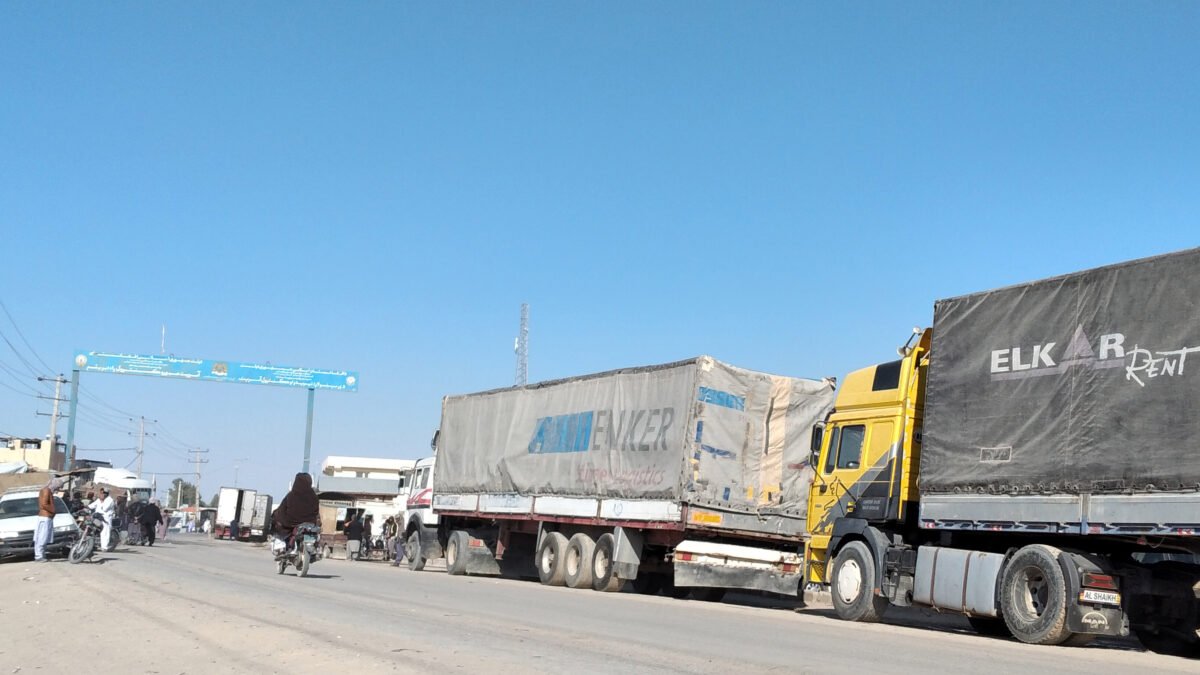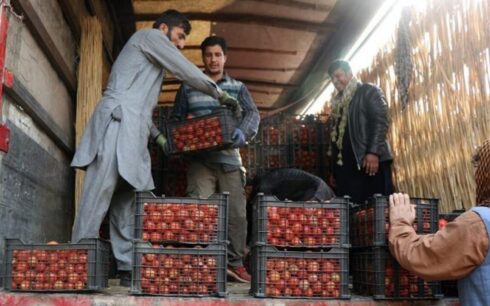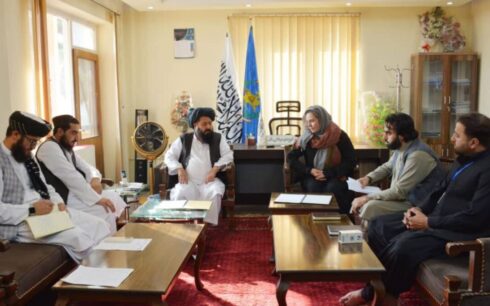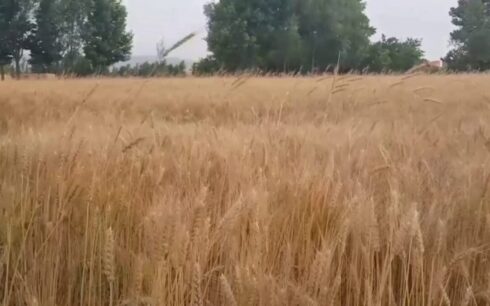Truck drivers have spoken out about gangs, allegedly affiliated with the former government, that are causing problems for them at the Pul-e-Abresham border crossing in Nimroz province.
Afghan truck drivers and businessmen told Amu TV they are fed up with the transit issues they face and with having to pay bribes after crossing the border into Iran.
Local Taliban officials, meanwhile, said that they have assigned a delegation to deal with these issues.
One truck driver, Mohammad Rasool Moradi, told Amu that gangs working in the area have ties to the former government and exert their influence to make things difficult for the truckers.
“Some circles that belong to the former government, use their influence at the main transit branch to create chaos, injustice, and challenges for drivers,” he said.
Moradi claimed a man called Allaudin fast-tracks cargo trucks through the clearance process, while other drivers have to wait in line. He said for every five legitimate clearances, 15 others are fast-tracked illicitly.
Moradi also stated that the Taliban customs officials were unaware of the transgressions and the injustice of the system.
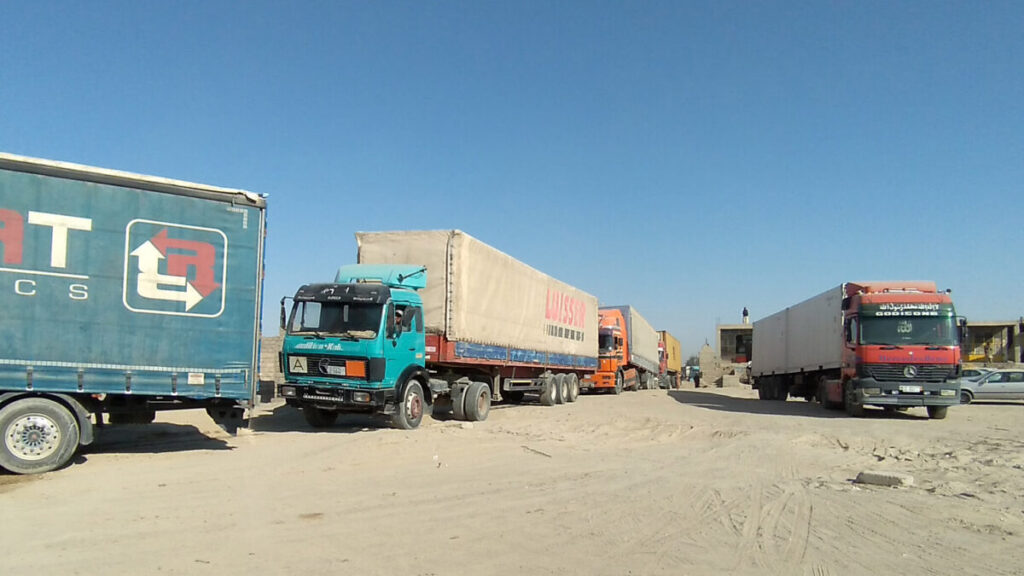
According to him, he has been waiting to clear customs for over two months. “It has been 65 days since I brought a shipment from the Bazar and I am still waiting for my turn.”
He said trucks controlled by these gangs can clear customs up to four times in a month as they travel backward and forwards over the border – this while other drivers wait for weeks to cross just once.
“Moreover, the transportation directorate has also ordered drivers to get a license for their vehicles. But when you visit the relevant departments to obtain a document and a license, the government is not responsive; and the department of transportation says that they are waiting for Kabul’s order to issue a driving license.”
Highlighting the corruption on Iran’s side of the border, one source stated: “When we go through passport control, the Iranian border checkpoint [forces] begin taking bribes. By the time we load and leave [our trucks] in Iran, they take from us 8 to 9 million [Iranian Toman = 16,000 to 18,000 afghani] in bribes. There is no one to turn to about this corruption; Iranian officials just take the money.”
He said: “While we begin loading [our trucks] in the holding bay, a person named Abdul Rahman takes 360,000 Tomans, while we used to pay 40,000 to 80,000 Tomans in the past. When leaving the terminal that registers the cargo document, here it is their duty and they receive a salary from their government, they take a bribe of 100,000 Toman from each driver. Again, during weighing, if a truck is overweight by 20kg, the driver will be fined and they will charge him again. At the checkpoint, there is a colonel named Najib who takes 500,000 Toman from each driver.”
He also said that drivers of vehicles carrying over their maximum weight can be asked to pay up to two million Toman to representatives of Afghan businessmen in Iran. If the drivers fail to do so, they can be denied border clearance and are made to wait for days.
Corruption ‘forced me to sell a truck’
Nematullah Rahmati, who has been crossing the Pul-e-Abresham border for 10 years, is another victim of corruption in Nimroz.
He told Amu TV the Iranian government has built a fuel depot at the border terminal to supply diesel to Afghan truck drivers. The diesel is legal and money paid for the fuel is deposited into the Iranian government’s bank account. “But when they cross the border, they (drivers) are accused of illegally loading fuel and their fuel is seized,” Rahmati said.
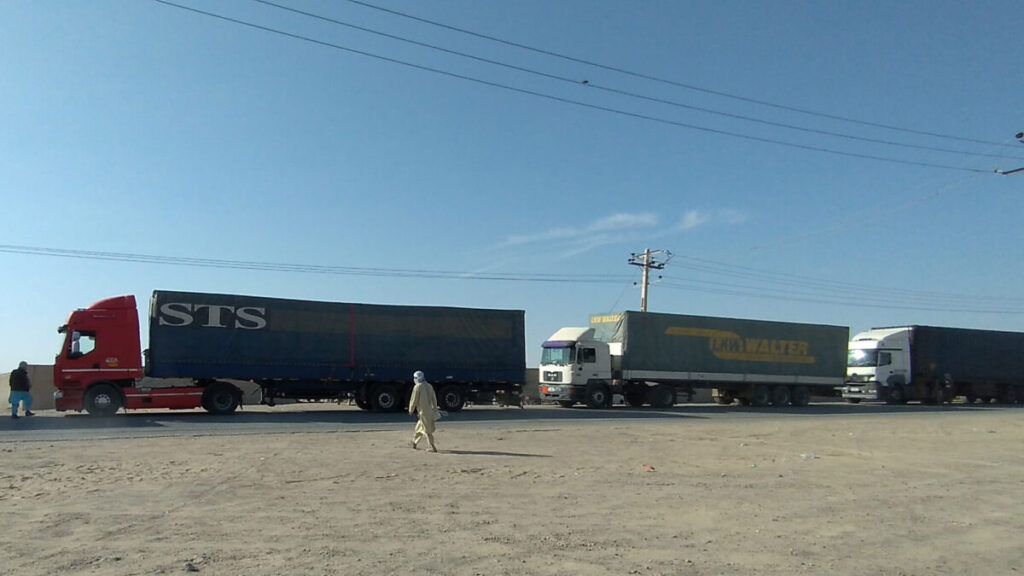
He also said that Iranian border officials fleece Afghan drivers. According to him, if the cargo clearance fee is between 60,000 and 80,000 afghani, a driver will lose about 5 million [Toman] in profit. But if the fee is 100,000 afghani, the drivers make no profit and only the truck’s expenses are covered.
He also stated that cargo fees are not consistent and that they differ between border crossings.
“We have no idea why the Iranian government has a double standard treatment with the drivers on the border of Islam Qala and Abrisham. They apply one rule to Abrisham, while they implement another law at the Islam Qala border. Due to this corruption, I was forced to sell one of my trucks. The Islamic Emirate (Taliban) must solve this issue,” Rahmati said.
He said that the Iranian government violates drivers’ legal rights as they continue to take bribes and force Afghan drivers to resort to illegal practices in order to bypass the issue. If drivers are caught, they are beaten up and their trucks are impounded for two months, Rahmati said. In addition, the owner of the consignment of goods does not pay bribes, making it the sole responsibility of drivers.
“There is still corruption and big issues ahead of the trade between the two countries at the Pul-e-Abresham border, which the caretaker government does not know about,” Rahmati said.
Iranian authorities ‘unaware’ of the issues
Abdul Wahid Farooq, head of the Taliban land transportation department in Nimroz, said: “The department of transportation has digitized the movement of transit vehicles and no one can pass without taking turns and being registered on the system.”
Farooq said the claims of irregularities regarding the clearance waiting list of drivers are baseless.
“The system is set up based on a schedule and a serial number. The number [of trucks] accepted is done through Iran Transportation and according to this table, 60 to 120 trucks go to the terminal for loading every day.”
According to Farooq, the Pul-e-Abresham port has a digital system in place and foreign vehicles receive return documents once they enter Afghanistan through Pul-e-Abresham; the document includes serial numbers, dates, name of the driver, vehicle’s plate number, and the name of their company, he said.
Calling the driver’s claims baseless, Farooq said: “Based on the new procedure of the ministry, all transit vehicles traveling via Pul-e-Abresham port must have official and legal documents. Otherwise, they will not be given a turn.”
Meanwhile, Farooq added that transit permission has dropped off due to crime and the smuggling of goods via unregistered vehicles.
Referring to the meeting that was held between the Taliban’s provincial governor, Nimroz officials, private companies, and the Chambers of Commerce, he stated: “In this meeting, the businessmen decided that we shall guarantee financial and the lives of the Iranian drivers that enter the territory of Afghanistan. So that the Iranian drivers should not suffer even slight damage. The Iranian side, they must give us this commitment that the mafia will not arbitrarily take money from Afghan drivers.”
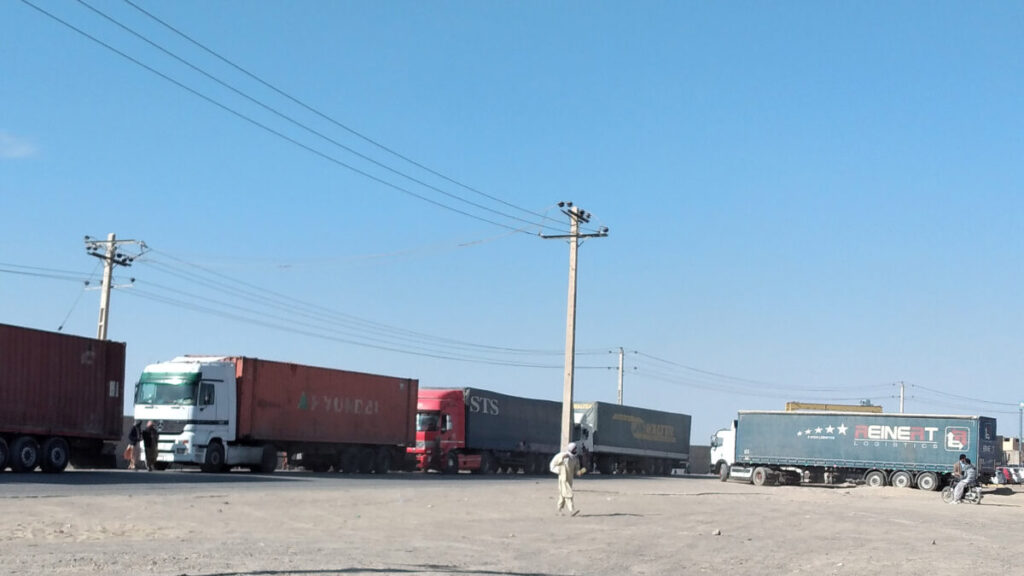
Farooq also said: “We have informed the central Iranian authorities of the issues raised by Afghan drivers, and they claim to be unaware of this issue. Pul-e-Abresham officials are not willing to hold a meeting.
“Corruption does not exist publically, maybe it exists underground. Regarding the corruption in the administration, the intelligence has been assigned the task to arrest the perpetrators of administrative corruption in the Pul-e-Abresham border, Bazarcha, and border transport branch and bring them to justice,” he said.
Nimroz province shares a border with Iran and Pakistan and the Pul-e-Abresham port is a key border crossing between Iran and Afghanistan, critical to boosting trade ties between the two countries.

